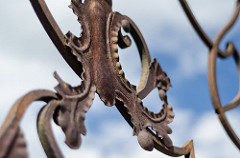By YANG JIAN
Translated by STEPHEN HAVEN and LI YONGYI
They said:
“Tear off the erhu strings,
Smash its body.”
We ended up without music.
They said:
“Chop this big old tree
Down to the stump.”
We ended up without shade.
They said:
“Kill this stonemason,
That carpenter, right now.”
We ended up without bridges;
Without pretty houses.
They said:
“Burn the ancient books,
Demolish the Confucian shrines,
Send the monks home to their mothers.”
We ended up without a moral sense,
We ended up without conscience.
I was born in 1967, an apocalyptic year,
Destined to look at things with a destructive eye,
Sick soon after I entered the world,
Destined to look at things as a morbid man.
Seeing that you all are dying
I’m given to a life that cannot die.
My word on the ruins, sealed in dust,
The iron gate shoved open.
Yang Jian was born in Anhui Province in 1967 and worked as a factory laborer for thirteen years. A practicing Buddhist and scholar of Chinese traditional culture, he began writing poetry during the mid-eighties. Laureate of the first Yiu Li’an Poetry Award (1995), the ninth Rougang Poetry Award (2000), the first Yulong Poetry Award (2006), and the prestigious Chinese Media Literature Award (2008), his books of poetry include Dusk (2003), which was rated as one of the ten best books of the year, Old Bridge (2007), and Remorse
(2009). Yang Jian also paints with ink and brush. He now lives in Ma’anshan, Anhui.
Stephen Haven is the author of The Last Sacred Place in North America
(2012, winner of the New American Press Poetry Prize). He has published two previous collections of poetry, Dust and Bread
(2008, for which he was named Ohio Poet of the Year), and The Long Silence of the Mohawk Carpet Smokestack
(2004). He directs the MFA Program in Creative Writing at Ashland University, in Ohio. He was twice a Fulbright Professor of American literature at universities in Beijing.
Li Yongyi is Professor of English at Chongqing University, in Chongqing, China. He was a 2012–2013 Fulbright Scholar in Residence at the University of Washington. His major fields of scholarship include Anglo-American modern poetry, classical Roman poetry, and classical Chinese poetry. He has translated fourteen books into Chinese from English, French and Latin. His translation of Carmina was the first Chinese translation of the entire body of Catullus’s poetry. He is the author on one collection of his own poems, Swordsman Poet Phantom.
[Purchase your copy of Issue 10 here.]
From the beginning, The Common has brought you transportive writing and exciting new voices. We are committed to supporting writers and maintaining free, unrestricted access to our website, but we can’t do it without you. Become an integral part of our global community of readers and writers by donating today. No amount is too small. Thank you!




